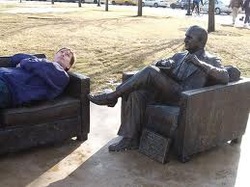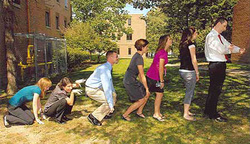"The possession of knowledge does not kill the sense of wonder and mystery. There is always more mystery" -Anais Nin
"The true sign of intelligence is not knowledge but imagination" -Albert Einstein
Here you will find Downloads of the Course Syllabus, some handouts and various supplemental resources. Material on this page changes monthly and in accordance with courses Dr. Paltin is currently teaching.

"As far as we can discern, the sole purpose of human existence is to kindle a light in the darkness of mere being." -C.G. Jung
"Show me a sane man and I will cure him for you."- C.G. Jung
2 May 2018 GUEST POSTEDITH GÓMEZ7 ways to be more productive when you study at home#productivity
There are many benefits of being able to take online classes at home. Studying from home makes it possible to have a job, take care of your children and save money on gas. Also, there are many options regarding what you can study: a foreign language, writing, marketing and even university courses. There’s no reason as to why you can’t focus on self-development: if you have internet, some free time and a computer, you have everything you will need.
So, if you want to progress your life, find a good job or get promoted, Gananci recommendsthat you look for what you love, think big and let go of the fear of failure that paralyzes you. Find your ideal online course at once!
However, without a librarian telling you to be quiet or a boss hoping for you to stay at your desk, it’s easy to get sidetracked. Here are seven tricks to make the most of learning from the comfort of your own home.
1. Go to your happy placeYou can try studying in different places, such as a park, a very quiet café or different nooks of your apartment. If you feel relaxed and happy, it is much easier for you to concentrate. Try to avoid noisy places to minimize distractions (such as a crowded shopping center).
Can’t go out? Create a perfect space to feel comfortable studying - clean, well organized and with good lighting. You can even put light some candles or incense if that helps you relax or play some environmental music (as long as it’s not something heavy or too lively).
2. Plan your coffee break wiselyThe best moments to charge your batteries are between 10 a.m. and noon, and between 2 p.m. and 5 p.m. This goes for coffee or your caffeine of choice. Why not early in the morning? The body produces cortisol naturally in the morning, which helps us wake up. Caffeine complicates the production of cortisol, which makes us more dependent on caffeine.
3. Make your laundry work for youIf you’re like me, your daily tasks are not done unless you procrastinate on completing something else. It can be very tempting to finally rearrange your dirty laundry drawer instead of writing that report. Try this instead: put a load of clothes and turn it into your work stopwatch. From the moment the wash cycle starts, you should write. You can take a break to put a new load, and then the timer starts again.
4. Take notes - seriously, take notesAs an online student, you are probably watching lectures on your computer. Do not let the convenience of being able to rewind it and reproduce it again prevent you from taking notes. In fact, leave your laptop and instead use a pen and paper. Research shows that when using laptops, students become more distracted and remember less. In addition to that, they also grasp less immediately. Doing many things at once makes productivity decrease by up to 40%.
5. Leave your caveOne of the most important tricks to studying at home is to make sure you’re still getting enough social time. People go crazy if they don’t talk to anyone all day, even introverts. Try taking your lunch to a local park, take a couple of hours to volunteer, or at least call your internet company to complain about something. Make sure you talk to someone during the day.
6. PantsI know. Wearing pajamas all day or not wearing pants can be one of the best parts of studying off campus. In my experience, not getting dressed makes me more likely to decide to watch a single episode on Netflix, in bed, after lunch. And then a second. Or maybe even three episodes. By getting up and getting ready for the day, you can help set the mood for a productive day.
7. Use the rule of threeThe rule of three says that you only have to do three things. Make a list of things to do today (preferably in Nozbe :)) and just put the following three things in it. Give each one of them a good cross-out (or a nice tick) once you finish it (make it satisfactory).
Once you have finished them, create your next list or add tasks to your Priority list in Nozbe. Make sure that each activity is small enough so that you can complete it quickly. It will help you to divide your extensive list of things to do into small objectives.
Now you know that studying from home is definitely possible, and with just a few tricks, you can get the most out of it. Always remember to keep a positive attitude to see the fruits of your work.
Edith Gómez
Edith is an editor at Gananci, is passionate about digital marketing, and has specialized in online communication. Every night she refuses to go to bed without learning something new. Fresh business ideas and bringing a creative look to the small world we live in get her going.
A Note on Dual Relationships: Many students inquire regarding the possibility of working with me as a therapist for their personal therapy. I cannot see a CURRENT student as a patient. Ethics do not permit me to serve as both therapist and professor for a student. However, students who have graduated, the programs I teach in may elect to enter into to treatment with me. The same dual relationship boundaries exist for hiring students. In addition, I do not accept friendship requests from current students on social networking, but students who are not longer in the program I teach for, or who have graduated may send friendship requests. I do connect with students, co-workers and businesses via LinkedIn.

Course Downloads and Supplemental Resources
PTSD and Trauma
http://www.istss.org/Home.htm International Society For Traumatic Stress Studies
http://www.nctsnet.org/ National Child Traumatic Stress Network
http://www.daniel-sonkin.com/attachment_psychotherapy.htm Attachment Theory and Psychotherapy by Daniel Jay Sonkin, Ph.D.
http://drdansiegel.com/Dan Siegel's official website neurobiology, mindsight and attachment
http://www.ptsd.va.gov/professional/videos/emv-psychopharm-mhcp.asp pharmacological treatment of PTSD
http://www.youtube.com/watch?v=-FX7OeE6XUQ&feature=shareStephen Colbert interview of Neil De Grasse
Tyson
JUNGIAN PSYCHOLOGY - A brief overview of Carl Gustav Jung, Psychoanalyst.
"If there is anything that we wish to change in the child, we should first examine it and see whether it is not something that could better be changed in ourselves." C. G. Jung

http://www.youtube.com/watch?v=OiHWbgqCndU
A poem by Clarissa Pinkola-Estes
"I hope you will go out and let stories happen to you, and that you will work them, water them with your blood and tears and you laughter till they bloom, till you yourself burst into bloom." -Clarissa Pinkola-Estes
A poem by Clarissa Pinkola-Estes
"I hope you will go out and let stories happen to you, and that you will work them, water them with your blood and tears and you laughter till they bloom, till you yourself burst into bloom." -Clarissa Pinkola-Estes
Click below to download Handout for Requirements for Oral Presentation
A wonderful overview of Jungian Psychoanalysis, which includes an example of Dream Interpretation http://wps.ablongman.com/wps/media/objects/208/213942/jungian.pdf
Jungian Twelve Step Model of Recovery

| jungian_twelve_steps.docx | |
| File Size: | 188 kb |
| File Type: | docx |
Download Dan Siegel's Healthy Mind Platter
| dan_siegel_healthy_mind_platter.pdf | |
| File Size: | 100 kb |
| File Type: | |
